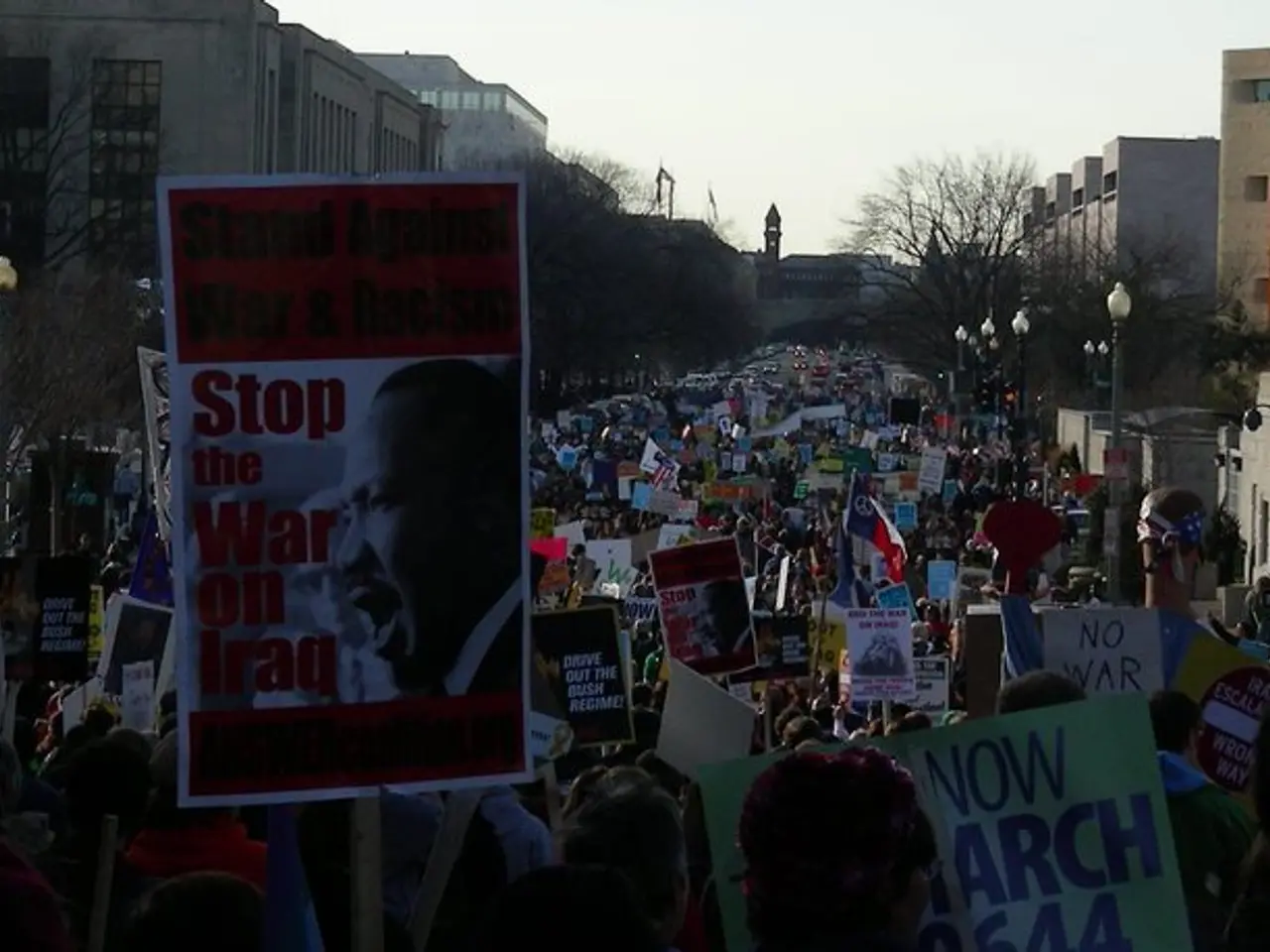London arrest count climbs to 532 for individuals backing pro-Palestinian organizations
In a controversial move, the Israeli government's security cabinet has given the green light to a new military operation in Gaza city, a decision heavily criticized by international leaders. This decision comes in the wake of a police operation in central London, where 532 individuals were arrested.
The London Police, in a statement, confirmed the arrests but did not provide any information about the current status or charges against the arrested individuals, nor about any injuries reported during the arrests. Being a member of Palestine Action or showing support for it is now a criminal offense punishable by up to 14 years in prison.
Of those arrested, 263 were men, 261 were women, and eight identified as non-binary or did not reveal their gender. The majority of arrests (522) were made for displaying a banner in support of the outlawed organization Palestine Action, under the Terrorism Act of 2000. Remaining arrests were made for assaulting officers, obstruction of police, or public order offenses.
The average age of those detained was 54 years. All arrested individuals were taken to district processing points. The London Police have warned they will gather all available documentation and materials to ensure the prosecution of those arrested in the operation.
The pro-Palestinian group Palestine Action has been legally classified as a "terrorist organization" in the UK since July last year. This classification has been a subject of criticism from Defend Our Juries, an organization that argues the ban is a "serious attack" on democracy and freedom of expression.
The demonstration in London comes as a response to the Israeli government's decision to launch a new military operation in Gaza city. Between 500 and 600 people gathered in London on Saturday to protest against the ban on Palestine Action, organized by Defend Our Juries.
Recognition of Palestine as a state carries significant diplomatic and policy implications. Formal recognition by key Western countries, such as France, Britain, and Canada, is expected to create stronger pressure for a revived peace process aiming to end the Israeli-Palestinian conflict based on the two-state solution. This could lead to concrete steps to halt Israeli settlement expansion and annexations.
Countries recognizing Palestine assume legal commitments to respect Palestinian sovereignty and international humanitarian law. They are required to reassess existing bilateral agreements with Israel to ensure consistency with obligations toward the State of Palestine, potentially leading to policy changes at both governmental and legislative levels.
With recognition, Palestine can act as a sovereign entity in international forums, join treaties and UN specialized agencies, exercise legal rights over its territory, and pursue legal actions in international courts against violations related to the Israeli occupation. Recognized as a state, Palestine upgrades the status of its diplomatic missions and official documents, reinforcing its international standing and sovereignty claims.
Recognition is part of a broader effort to achieve peace, security, and regional integration. It aligns with international commitments to end occupation, resolve outstanding issues, and establish two sovereign states living in peace and mutual recognition. It also aims at mitigating ongoing violence and addressing humanitarian concerns in Gaza and the West Bank.
Political ramifications of recognition by Western and other states signify a shift in international policy and send a message of dissatisfaction with the status quo. It potentially marginalizes unilateral Israeli policies deemed as undermining Palestinian statehood prospects, possibly leading to changes in diplomatic, economic, and security relationships in the Middle East.
In summary, the recognition of Palestine as a state is a multifaceted development that leads to formal diplomatic changes, legal responsibilities for recognizing states, legal empowerment for Palestine in international law, and renewed international efforts toward a two-state resolution of the conflict.
- The political implications of recognizing Palestine as a state can influence the global community's approach towards the Israeli-Palestinian conflict, potentially marginalizing contentious Israeli policies and leading to changes in diplomatic, economic, and security relationships within the Middle East.
- The British police's recent arrests in connection with the pro-Palestinian demonstration in London emphasize the criminalization of support for Palestine Action, a move criticized by Defend Our Juries as an attack on democracy and freedom of expression within the general-news context.






